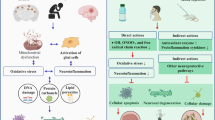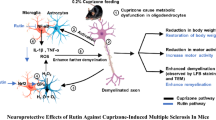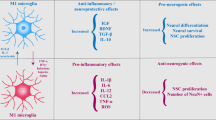Abstract
Traumatic brain injury (TBI) is a leading cause of death and long-term disability. Fucoidan, a sulfated polysaccharide extracted from brown algae, possesses potent anti-oxidative and anti-inflammatory effects. Considering TBI happens frequently in adults, especially in aged individuals, we herein sought to define the protective effects of low-molecular-weight fucoidan (LMWF) in the aged mice. 16- to 18-month-old mice administered with LMWF (1–50 mg/kg) or vehicle were subjected to TBI using a controlled cortical impact (CCI) model. LMWF at the doses of 10 and 50 mg/kg significantly reduced both cortical and hippocampal lesion volume. This protection was associated with reduced neuronal apoptosis, as evidenced by TUNEL staining. Importantly, LMWF was effective even when administered up to 4 h after TBI. Treatment with LMWF improved long-term neurobehavioral outcomes, including sensorimotor function, and hippocampus-associated spatial learning and memory. In addition, LMWF significantly suppressed protein carbonyl, lipid peroxidation, reactive oxygen species (ROS) generation, as well as mitochondrial dysfunction, which was evidenced by mitochondrial cytochrome c release and collapse of mitochondrial membrane potential (MMP). To evaluate the underlying molecular mechanisms, the expression of sirtuin 3 (Sirt3) was detected by RT-PCR and Western blot. The results showed that TBI significantly increased the expression of Sirt3, which was further elevated by LMWF treatment. Knockdown of Sirt3 using intracerebroventricular injection of small interfering RNA (siRNA) partially prevented the therapeutic effects of LMWF. Collectively, these findings demonstrated that LMWF exerts neuroprotection against TBI in the aged brain, which may be associated with the attenuation of mitochondrial dysfunction through Sirt3 activation.






Similar content being viewed by others
References
Awasthi D, Church DF, Torbati D, Carey ME, Pryor WA (1997) Oxidative stress following traumatic brain injury in rats. Surg Neurol 47(6):575–581; discussion 581–572
Balaban RS, Nemoto S, Finkel T (2005) Mitochondria, oxidants, and aging. Cell 120(4):483–495. doi:10.1016/j.cell.2005.02.001
Barker-Collo S, Feigin VL (2008) Memory deficit after traumatic brain injury: how big is the problem in New Zealand and what management strategies are available? N Z Med J 121(1268):U2903
Bause AS, Haigis MC (2013) SIRT3 regulation of mitochondrial oxidative stress. Exp Gerontol 48(7):634–639. doi:10.1016/j.exger.2012.08.007
Berteau O, Mulloy B (2003) Sulfated fucans, fresh perspectives: structures, functions, and biological properties of sulfated fucans and an overview of enzymes active toward this class of polysaccharide. Glycobiology 13(6):29R–40R. doi:10.1093/glycob/cwg058
Brown K, Xie S, Qiu X, Mohrin M, Shin J, Liu Y, Zhang D, Scadden DT, Chen D (2013) SIRT3 reverses aging-associated degeneration. Cell Rep 3(2):319–327. doi:10.1016/j.celrep.2013.01.005
Chen T, Liu W, Chao X, Zhang L, Qu Y, Huo J, Fei Z (2011) Salvianolic acid B attenuates brain damage and inflammation after traumatic brain injury in mice. Brain Res Bull 84(2):163–168. doi:10.1016/j.brainresbull.2010.11.015
Chen J, Wang W, Zhang Q, Li F, Lei T, Luo D, Zhou H, Yang B (2013) Low molecular weight fucoidan against renal ischemia-reperfusion injury via inhibition of the MAPK signaling pathway. PLoS ONE 8(2):e56224. doi:10.1371/journal.pone.0056224
Chen W, Qi J, Feng F, Wang MD, Bao G, Wang T, Xiang M, Xie WF (2014) Neuroprotective effect of allicin against traumatic brain injury via Akt/endothelial nitric oxide synthase pathway-mediated anti-inflammatory and anti-oxidative activities. Neurochem Int 68:28–37. doi:10.1016/j.neuint.2014.01.015
Cheng G, Kong RH, Zhang LM, Zhang JN (2012) Mitochondria in traumatic brain injury and mitochondrial-targeted multipotential therapeutic strategies. Br J Pharmacol 167(4):699–719. doi:10.1111/j.1476-5381.2012.02025.x
Corrigan JD, Selassie AW, Orman JA (2010) The epidemiology of traumatic brain injury. J Head Trauma Rehab 25(2):72–80. doi:10.1097/HTR.0b013e3181ccc8b4
Dai SH, Chen T, Wang YH, Zhu J, Luo P, Rao W, Yang YF, Fei Z, Jiang XF (2014a) Sirt3 attenuates hydrogen peroxide-induced oxidative stress through the preservation of mitochondrial function in HT22 cells. Int J Mol Med 34(4):1159–1168. doi:10.3892/ijmm.2014.1876
Dai SH, Chen T, Wang YH, Zhu J, Luo P, Rao W, Yang YF, Fei Z, Jiang XF (2014b) Sirt3 protects cortical neurons against oxidative stress via regulating mitochondrial Ca2+ and mitochondrial biogenesis. Int J Mol Sci 15(8):14591–14609. doi:10.3390/ijms150814591
Fitton JH (2011) Therapies from fucoidan; multifunctional marine polymers. Marine Drugs 9(10):1731–1760. doi:10.3390/md9101731
Greenwald BD, Burnett DM, Miller MA (2003) Congenital and acquired brain injury. 1. Brain injury: epidemiology and pathophysiology. Arch Phys Med Rehab 84(3 Suppl 1):S3–S7
Hadass O, Tomlinson BN, Gooyit M, Chen S, Purdy JJ, Walker JM, Zhang C, Giritharan AB, Purnell W, Robinson CR 2nd, Shin D, Schroeder VA, Suckow MA, Simonyi A, Sun GY, Mobashery S, Cui J, Chang M, Gu Z (2013) Selective inhibition of matrix metalloproteinase-9 attenuates secondary damage resulting from severe traumatic brain injury. PLoS ONE 8(10):e76904. doi:10.1371/journal.pone.0076904
Hiebert JB, Shen Q, Thimmesch AR, Pierce JD (2015) Traumatic brain injury and mitochondrial dysfunction. Am J Med Sci 350(2):132–138. doi:10.1097/MAJ.0000000000000506
Hofman M, Koopmans G, Kobbe P, Poeze M, Andruszkow H, Brink PR, Pape HC (2015) Improved fracture healing in patients with concomitant traumatic brain injury: proven or not? Mediat Inflamm 2015:204842. doi:10.1155/2015/204842
Hu W, Guan LS, Dang XB, Ren PY, Zhang YL (2014) Small-molecule inhibitors at the PSD-95/nNOS interface attenuate MPP + -induced neuronal injury through Sirt3 mediated inhibition of mitochondrial dysfunction. Neurochem Int 79:57–64. doi:10.1016/j.neuint.2014.10.005
Kwak JY (2014) Fucoidan as a marine anticancer agent in preclinical development. Marine Drugs 12(2):851–870. doi:10.3390/md12020851
Li B, Lu F, Wei X, Zhao R (2008) Fucoidan: structure and bioactivity. Molecules 13(8):1671–1695
Luyt CE, Meddahi-Pelle A, Ho-Tin-Noe B, Colliec-Jouault S, Guezennec J, Louedec L, Prats H, Jacob MP, Osborne-Pellegrin M, Letourneur D, Michel JB (2003) Low-molecular-weight fucoidan promotes therapeutic revascularization in a rat model of critical hindlimb ischemia. J Pharmacol Exp Ther 305(1):24–30. doi:10.1124/jpet.102.046144
Marklund N, Hillered L (2011) Animal modelling of traumatic brain injury in preclinical drug development: where do we go from here? Br J Pharmacol 164(4):1207–1229. doi:10.1111/j.1476-5381.2010.01163.x
Masel BE, DeWitt DS (2010) Traumatic brain injury: a disease process, not an event. J Neurotrauma 27(8):1529–1540. doi:10.1089/neu.2010.1358
McConeghy KW, Hatton J, Hughes L, Cook AM (2012) A review of neuroprotection pharmacology and therapies in patients with acute traumatic brain injury. CNS Drugs 26(7):613–636. doi:10.2165/11634020-000000000-00000
McDonnell E, Peterson BS, Bomze HM, Hirschey MD (2015) SIRT3 regulates progression and development of diseases of aging. TEM, Trends in endocrinology and metabolism. doi:10.1016/j.tem.2015.06.001
Menon DK (2009) Unique challenges in clinical trials in traumatic brain injury. Crit Care Med 37(1 Suppl):S129–135. doi:10.1097/CCM.0b013e3181921225
Mioni G, Grondin S, Stablum F (2014) Temporal dysfunction in traumatic brain injury patients: primary or secondary impairment? Front Hum Neurosci 8:269. doi:10.3389/fnhum.2014.00269
Napolitano E, Elovic EP, Qureshi AI (2005) Pharmacological stimulant treatment of neurocognitive and functional deficits after traumatic and non-traumatic brain injury. Med Sci Monit 11(6):RA212–RA220
Narayan RK, Michel ME, Ansell B, Baethmann A, Biegon A, Bracken MB, Bullock MR, Choi SC, Clifton GL, Contant CF, Coplin WM, Dietrich WD, Ghajar J, Grady SM, Grossman RG, Hall ED, Heetderks W, Hovda DA, Jallo J, Katz RL, Knoller N, Kochanek PM, Maas AI, Majde J, Marion DW, Marmarou A, Marshall LF, McIntosh TK, Miller E, Mohberg N, Muizelaar JP, Pitts LH, Quinn P, Riesenfeld G, Robertson CS, Strauss KI, Teasdale G, Temkin N, Tuma R, Wade C, Walker MD, Weinrich M, Whyte J, Wilberger J, Young AB, Yurkewicz L (2002) Clinical trials in head injury. J Neurotrauma 19(5):503–557. doi:10.1089/089771502753754037
Onyango P, Celic I, McCaffery JM, Boeke JD, Feinberg AP (2002) SIRT3, a human SIR2 homologue, is an NAD-dependent deacetylase localized to mitochondria. Proc Natl Acad Sci USA 99(21):13653–13658. doi:10.1073/pnas.222538099
Pillai VB, Sundaresan NR, Jeevanandam V, Gupta MP (2010) Mitochondrial SIRT3 and heart disease. Cardiovasc Res 88(2):250–256. doi:10.1093/cvr/cvq250
Robertson CL, Saraswati M, Fiskum G (2007) Mitochondrial dysfunction early after traumatic brain injury in immature rats. J Neurochem 101(5):1248–1257. doi:10.1111/j.1471-4159.2007.04489.x
Rodriguez-Rodriguez A, Egea-Guerrero JJ, Murillo-Cabezas F, Carrillo-Vico A (2014) Oxidative stress in traumatic brain injury. Curr Med Chem 21(10):1201–1211
Thal SC, Neuhaus W (2014) The blood-brain barrier as a target in traumatic brain injury treatment. Arch Med Res 45(8):698–710. doi:10.1016/j.arcmed.2014.11.006
Tyurin VA, Tyurina YY, Borisenko GG, Sokolova TV, Ritov VB, Quinn PJ, Rose M, Kochanek P, Graham SH, Kagan VE (2000) Oxidative stress following traumatic brain injury in rats: quantitation of biomarkers and detection of free radical intermediates. J Neurochem 75(5):2178–2189
Veena CK, Josephine A, Preetha SP, Rajesh NG, Varalakshmi P (2008) Mitochondrial dysfunction in an animal model of hyperoxaluria: a prophylactic approach with fucoidan. Eur J Pharmacol 579(1–3):330–336. doi:10.1016/j.ejphar.2007.09.044
Ye R, Kong X, Yang Q, Zhang Y, Han J, Zhao G (2011) Ginsenoside Rd attenuates redox imbalance and improves stroke outcome after focal cerebral ischemia in aged mice. Neuropharmacology 61(4):815–824. doi:10.1016/j.neuropharm.2011.05.029
Yu X, Zhang Q, Cui W, Zeng Z, Yang W, Zhang C, Zhao H, Gao W, Wang X, Luo D (2014) Low molecular weight fucoidan alleviates cardiac dysfunction in diabetic Goto-Kakizaki rats by reducing oxidative stress and cardiomyocyte apoptosis. J Diabetes Res 2014:420929. doi:10.1155/2014/420929
Zheng S, Wei S, Wang X, Xu Y, Xiao Y, Liu H, Jia J, Cheng J (2015) Sphingosine kinase 1 mediates neuroinflammation following cerebral ischemia. Exp Neurol. doi:10.1016/j.expneurol.2015.03.012
Acknowledgments
The authors would like to thank Dr. Terry Chen for his technical support for the experiments and the preparation of the manuscript.
Author information
Authors and Affiliations
Corresponding author
Ethics declarations
Conflict of interest
The authors declare that they have no conflict of interest.
Additional information
Tao Wang and Mang Zhu contributed equally to this work.
Rights and permissions
About this article
Cite this article
Wang, T., Zhu, M. & He, ZZ. Low-Molecular-Weight Fucoidan Attenuates Mitochondrial Dysfunction and Improves Neurological Outcome After Traumatic Brain Injury in Aged Mice: Involvement of Sirt3. Cell Mol Neurobiol 36, 1257–1268 (2016). https://doi.org/10.1007/s10571-015-0323-2
Received:
Accepted:
Published:
Issue Date:
DOI: https://doi.org/10.1007/s10571-015-0323-2




